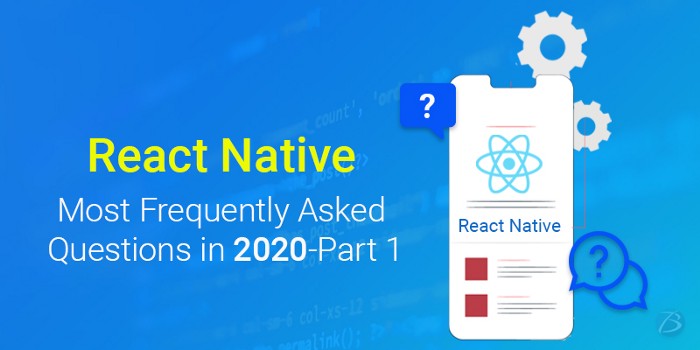
React Native is widely being used for diverse projects by several professionals worldwide. So, here, we have answered some of the most frequently asked questions about this disruptive technology. These questions are intended to software developers, business owners, project managers, and other technical professionals. These FAQs are answered after collaborating with experienced professionals in a prominent React Native app development company. So let’s get started.
What is React Native and what is its Purpose?
React Native is an open-source cross-platform framework developed by Facebook, Inc. in the year 2015. It is considered to be a combination of the best parts JavaScript library and React. It is used for architecting natively rendering apps for iOS and Android platforms as well as for web apps, and UWP multi-platform apps. It is a fast, lightweight framework used for developing scalable and stable apps.
In the corporate world, a host of tech giants such as Facebook itself, Instagram, Bloomberg, Uber Eats, Skype, Pinterest, Airbnb, Walmart, Wix, Tesla, etc. have used this framework in their projects. A large number of start-ups, small, medium, or large-sized companies use this cost-efficient framework for their requirements. Due to its huge scope, many React Native app development services are popping up across the globe.
How is React Native connected to JavaScript?
Well, React Native is basically a JavaScript framework. Its codes are written in JavaScript. Also, JavaScript enables this framework to iterate at a very high speed and create high-performing apps.
Can I migrate an existing app to React Native?
Yes. React Native is utilized for building brand-new apps from scratch as well as for additions in the existing apps. It supports the gradual migration of the apps.
How much code can I reuse while using React Native for any project?
Up to 100% code can be reused between Android and iOS apps. Between web and mobile app development, about 60-85% code can be reused. Almost all the components and services can be shared and reused.
How is React Native’s performance in comparison with native?
Native apps and React Native apps are almost similar when someone is looking for 60fps user interface performance. However, native apps usually surpass React Native apps in case of raw number-crunching performance. So React native is a good choice for a large number of apps, but when it comes to complicated apps with a fine-tuned performance, native code is preferable.
What are the potential benefits of the React Native framework?
React Native development is highly preferred for building native-looking apps at a fast pace with fewer developers. Also, this technology is easy to learn for new developers. It has third-party plugin support and several pre-built components for the creation of feature-rich apps that are reliable and stable. Also, it is a cross-platform framework allowing adaptation to various platforms.
React Native comes with technical advantages like modular architecture, hot reloading, declarative coding style, etc. These help the developers to ensure speedy development and thus ensure a faster time-to-market. Also, React Native is backed by a vibrant community. As this framework offers so many advantages, it is a favorite choice of a plethora of myriad React Native app development companies globally.
What are some limitations associated with React Native?
React Native, like any other technologies, comes with some limitations. So, a React Native development company must always take into consideration, the below-mentioned limitations before working on any related projects.
- Slow performance of React Native apps in case of multiprocessing or parallel threading.
- High dependency on Native developers for several complicated tasks as well as heavy computational processes.
- Difficulty in finding bugs and errors in abstraction layers and resolving them.
- Challenges while testing the iOS apps on any other testing service except for Apple’s TestFlight.
What are some of the competitors to React Native?
Apart from React Native, there are many other open-source cross-platform tools in the software market. Let us have a glimpse of them.
Flutter– Flutter was released in 2017 by Google and its main programming language is Dart. It is well-suited for MVP development.
Xamarin-This technology is powered by Microsoft. It is used for developing iOS, Android, and Windows apps.
Ionic– Ionic was founded in 2012 for building hybrid mobile apps using JavaScript, CSS, and HTML5. It is primarily focused on the appearance and UI interactions of the apps.
Apache Cordova– It is also known as PhoneGap and is supported by Adobe. After combining with UI frameworks like Dojo Mobile, Sencha Touch, jQuery Mobile, etc., Apache Cordova helps in the development of apps simply with the use of HTML, CSS, and JavaScript.
Is React Native cost-effective? How much will React Native apps cost?
React Native is considered a cost-effective solution due to the reusability of code. While using this for a single platform, it may cost equally as native apps. But if deployed on the second platform, it can cost just 10% or so.
We hope these were helpful to you. For any further questions on this technology, you may either add in the comment section or drop us a line at sales.enquiry@biz4Solutions.com.
Also, if you are looking forward to hiring a React Native app development company for your projects, contact Biz4Solutions. Based in Texas, this company has a track record of creating world-class web and mobile apps for clients in diverse domains. Get in touch to know more.

